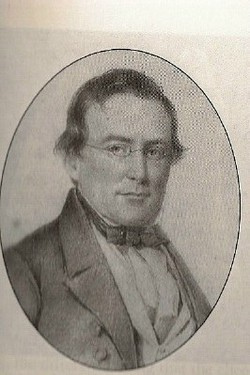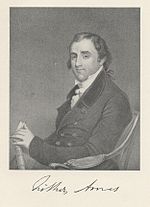
The Alien and Sedition Acts were a set of four laws enacted in 1798 that applied restrictions to immigration and speech in the United States. The Naturalization Act increased the requirements to seek citizenship, the Alien Friends Act allowed the president to imprison and deport non-citizens, the Alien Enemies Act gave the president additional powers to detain non-citizens during times of war, and the Sedition Act criminalized false and malicious statements about the federal government. The Alien Friends Act and the Sedition Act expired after a set number of years, and the Naturalization Act was repealed in 1802. The Alien Enemies Act is still in effect.

Dedham is a town in and the county seat of Norfolk County, Massachusetts. Located on Boston's southwest border, the population was 25,364 at the 2020 census.

The Federalist Party was a conservative and nationalist American political party and the first political party in the United States. Under Alexander Hamilton, it dominated the national government from 1789 to 1801. Defeated by the Democratic-Republican Party in 1800, it became a minority party while keeping its stronghold in New England and made a brief resurgence by opposing the War of 1812. It then collapsed with its last presidential candidate in 1816. Remnants lasted for a few years afterwards. The party appealed to businesses and to conservatives who favored banks, national over state government, manufacturing, an army and navy, and in world affairs preferred Great Britain and strongly opposed the French Revolution and Napoleonic wars. The party favored centralization, federalism, modernization, industrialization, and protectionism.

The 5th United States Congress was a meeting of the legislative branch of the United States federal government, consisting of the United States Senate and the United States House of Representatives. It met at Congress Hall in Philadelphia, Pennsylvania, from March 4, 1797, to March 4, 1799, during the first two years of John Adams' presidency. In the context of the Quasi-War with France, the Alien and Sedition Acts were passed by Congress. The Acts were overwhelmingly supported by the Federalists and mostly opposed by the Democratic-Republicans. Some Democratic-Republicans, such as Timothy Bloodworth, said they would support formally going to war against France but they opposed the Alien and Sedition Acts which Bloodworth and others believed were unconstitutional.

Fisher Ames was a Representative in the United States Congress from the 1st Congressional District of Massachusetts. He was an important leader of the Federalist Party in the House, and was noted for his oratorical skill.
Sedition is overt conduct, such as speech or organization, that tends toward rebellion against the established order. Sedition often includes subversion of a constitution and incitement of discontent toward, or insurrection against, established authority. Sedition may include any commotion, though not aimed at direct and open violence against the laws. Seditious words in writing are seditious libel. A seditionist is one who engages in or promotes the interest of sedition.

Matthew Lyon was an Irish-born American printer, farmer, soldier and politician, who served as a United States representative from both Vermont and Kentucky.

A liberty pole is a wooden pole, or sometimes spear or lance, surmounted by a "cap of liberty", mostly of the Phrygian cap. The symbol originated in the immediate aftermath of the assassination of the Roman dictator Julius Caesar by a group of Rome's Senators in 44 BCE. Immediately after Caesar was killed the assassins, or Liberatores as they called themselves, went through the streets with their bloody weapons held up, one carrying a pileus carried on the tip of a spear. This symbolized that the Roman people had been freed from the rule of Caesar, which the assassins claimed had become a tyranny because it overstepped the authority of the Senate and thus betrayed the Republic.
The Midnight Judges Act represented an effort to solve an issue in the U.S. Supreme Court during the early 19th century. There was concern, beginning in 1789, about the system that required the Justices of the Supreme Court to "ride circuit" and reiterate decisions made in the appellate level courts. The Supreme Court Justices had often expressed concern and suggested that the judges of the Supreme and circuit courts be divided. The Act was repealed by Congress on January 22, 1802.

Benjamin Franklin Bache was an American journalist, printer and publisher. He founded the Philadelphia Aurora, a newspaper that supported Jeffersonian philosophy. He frequently attacked the Federalist political leaders, including Presidents George Washington and John Adams, and historian Gordon S. Wood wrote that "no editor did more to politicize the press in the 1790s." His paper's heated attacks are thought to have contributed to passage of the Alien and Sedition Acts by the 5th United States Congress and signed by President John Adams in 1798.
James Thomson Callender was a political pamphleteer and journalist whose writing was controversial in his native Scotland and later, also in the United States. His revelations concerning George Washington, Alexander Hamilton, and later Thomas Jefferson, led to his marginalization politically. His contemporary reputation as a "scandalmonger" has overshadowed Callender's frequently perceptive analyses of revolutionary events. He wrote against the continuing influence of the British Crown, and he warned that Adams, Washington and Hamilton planned to impose a titled aristocracy and hereditary positions in the Senate and the Executive. In the United States, he was a central figure in the press wars between the Federalist and Democratic-Republican parties. After Jefferson won the presidency, Callender solicited employment as a postmaster, which was denied by Jefferson. Callender then published existing rumors claiming President Jefferson had children with slave Sally Hemings.

The presidency of John Adams, began on March 4, 1797, when John Adams was inaugurated as the second president of the United States, and ended on March 4, 1801. Adams, who had served as vice president under George Washington, took office as president after winning the 1796 presidential election. The only member of the Federalist Party to ever serve as president, his presidency ended after a single term following his defeat in the 1800 presidential election. He was succeeded by Thomas Jefferson of the opposition Democratic-Republican Party.

John Adams was an American statesman, attorney, diplomat, writer, and Founding Father who served as the second president of the United States from 1797 to 1801. Before his presidency, he was a leader of the American Revolution that achieved independence from Great Britain. During the latter part of the Revolutionary War and in the early years of the new nation, he served the U.S. government as a senior diplomat in Europe. Adams was the first person to hold the office of vice president of the United States, serving from 1789 to 1797. He was a dedicated diarist and regularly corresponded with important contemporaries, including his wife and adviser Abigail Adams and his friend and political rival Thomas Jefferson.
Events from the year 1798 in the United States.
Events from the year 1799 in the United States.
Seditious conspiracy is a crime in various jurisdictions of conspiring against the authority or legitimacy of the state. As a form of sedition, it has been described as a serious but lesser counterpart to treason, targeting activities that undermine the state without directly attacking it.
Benjamin Fairbanks was an 18th-century farmer and selectmen from Dedham, Massachusetts who received the lightest sentence of anyone ever convicted under the Sedition Act of 1798.

The history of Dedham, Massachusetts from 1700 to 1799 saw the town become one of the largest and most influential country towns in Massachusetts. As the population grew and residents moved to outlying areas of the town, battles for political power took place. Similar battles were taking place within the churches, as liberal and conservative factions bristled at paying for ministers with whom they had differences of theological opinion. New parishes and preciencts were formed, and eventually several new towns broke away.

The Dedham Liberty Pole was a liberty pole erected in 1798 in Dedham, Massachusetts. Several of those involved with the pole were arrested, resulting in both the harshest, and the lightest, sentences ever imposed under the Sedition Act of 1798.











